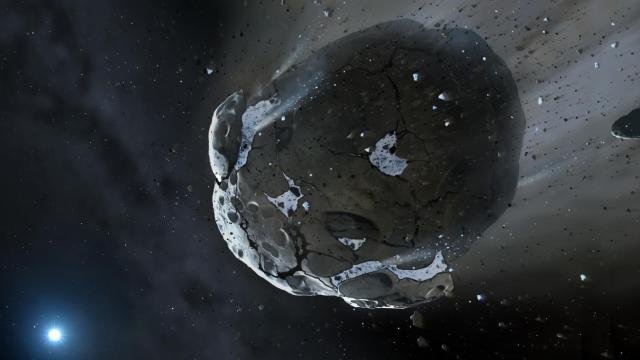SimEarth was right about one thing. The best way to wet up a planet? Hurl a bunch of icy asteroids at it. That, at least, is one interpretation of a new study published in the Royal Astronomical Society, which supports the hypothesis that most of our planet’s water crash-landed via space rocks eons ago. And the same process could be making waterworlds all over the galaxy.
Top image: Mark A. Garlick, space-art.co.uk, University of Warwick
“It is believed that the Earth was initially dry, but our research strongly supports the view that the oceans we have today were created as a result of impacts by water-rich comets or asteroids,” said lead study author Roberto Raddi of the University of Warwick in a statement.
That inference about the cosmic origin of Earth’s oceans comes from an unlikely source — a white dwarf star, the burnt-out core of a star like our Sun. In their study, the astronomers observed large amounts of hydrogen and oxygen in the atmosphere of a white dwarf called SDSS J1242+5226. While most white dwarfs naturally contain hydrogen, this particular star is one of a small percentage whose atmosphere combusted in a “shell flash” that should have burnt up all of its hydrogen, leaving only helium behind. The discovery of hydrogen and oxygen together in a star which shouldn’t contain either is strong evidence that a water-rich exo-asteroid hurled itself into the stellar body and was annihilated.
“Our analysis shows that this asteroid had a large content of water, either in the form of ice, or hydrate metals, and that this asteroid was comparable in size to, if not larger than, Ceres, the biggest asteroid in the solar system,” study co-author Boris Gänsicke told me in an email. (If melted, scientists believe Ceres may contain more fresh water than is present on our entire planet.)
Following this finding, the authors turned to a larger set of white dwarfs, and likewise found strong evidence that many of them are hit over their long lifetimes by water-rich asteroids or comets. Of course, white dwarfs aren’t planets, so these observations don’t offer direct evidence that asteroids are slinging oceans at Earth-like worlds. But, Gänsicke says, if stars are being pummelled with wet rocks, there’s no reason to think this isn’t also happening to planets in the not-too-hot, not-too-cold habitable zones of their stars. Planets like Earth.
“This shows that in other planetary systems there seems to be no shortage of water carriers that could deliver oceans to other Earth-like planets,” Gänsicke said.
That’s awesome news, because, although our scopes aren’t yet powerful enough to directly observe water on the surface of planets outside our solar system, we’re really hoping other water-rich worlds are out there. While a massive impact would devastate life on Earth today, there’s no reason icy asteroids aren’t helping to kickstart life all over the galaxy.
Read the full scientific paper here.
